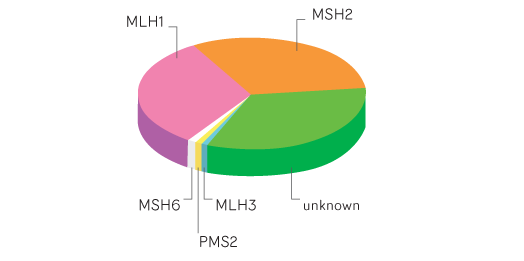HNPCC and FAP genes
Both hereditary syndromes (HNPCC and FAP) results from mutations in genes linked to DNA repair mechanisms.
HNPCC

The mutated genes behind HNPCC are usually MLH1 or MSH2, but can also be MSH6, MLH3, PMS1 or PMS2. All of them are part of DNA repair mechanisms.
In fact, when the cells multiply, their DNA (their genetic material) has to be duplicated, so each daughter cell inherits one copy.
If there are mistakes during this process the proteins produced by the genes linked to DNA repair mechanisms (such as MLH1, MSH2, etc.) correct the errors. If these genes/proteins/repair mechanisms do not work correctly, the DNA accumulates errors that could lead to cancer.
This lack of "repair" also can lead to microsatellite instability (when the two strands of DNA that we all have do not pair properly) a phenomenon for which there is already a diagnostic test .
FAP
FAP syndrom is linked to mutations in the APC gene.
Like the BRCA genes in breast cancer, APC is a tumor suppressor gene. It controls cellular multiplication and division, assuring that these are processed orderly and at the right speed.
If APC is not functioning correctly, the cell starts multiplying without control.
All these genes, once abnormal, increase mainly the risk of colorectal cancer, but can also promote other cancers.
Learn more about the risks linked to mutations in these genes:




